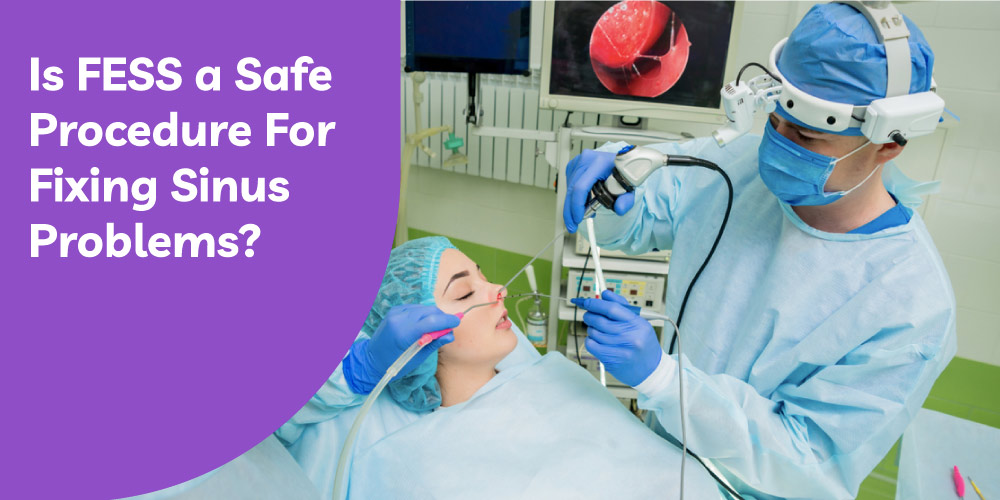FESS or functional endoscopic sinus surgery has been considered a safe practice since the early 1990 to treat sinus infections. According to the data by NCBI, more than 85% of people benefit highly from the surgery while others experience 90% improvement in the symptoms of chronic sinusitis such as breathing issues, frequent sore throat, etc. The advancements in technology and modern equipment have revolutionized the treatment of sinusitis with a very high success rate. Let us see why FESS is considered an effective surgery and what makes it a safe procedure.
What Makes FESS a Safe Procedure?
FESS is a safe procedure with theoretical incidences of minor complications accounting for 3-4% and major complications accounting for less than 1%. The risk of complications, however, depends on the health condition of the patient and the surgical experience of the ENT surgeon.
Sinus surgery (FESS) involves an endoscope which is used to view the structure of the nose and sinus cavity. The endoscope allows better identification of any obstruction or underlying disease, that can cause sinus blockage. This is done with great precision without damaging any surrounding tissues in the nasal cavity. The surgeon, then eventually, locates and operates the obstruction in the tissue by removing any necessary tissue using minimal incision. This ensures rapid healing and a shorter recovery period. FESS is an outpatient procedure which means the patient can go home within 24 hours after the surgery if the doctor suspects no complications.
Why Choose FESS for Sinus Surgery?
While home remedies and medications can help in managing the symptoms of mild sinus infections, they are not always effective procedures to treat sinus problems permanently. FESS involves minimal incisions to remove sinus polyps and other obstructions that can cause significant breathing problems. Due to the nature of small incisions, blood loss during surgery is almost nil which contributes to a faster recovery. The chances of complications during the surgery are practically negligible.
The ENT surgeon inserts an endoscope, which is a small tube with a camera attached to the other end. The patient is given local or general anesthesia before to procedure to ensure no pain. The surgeon utilizes camera images to detect the cause of congestion in the nasal cavity. Using tiny precision cutting instruments, the surgeon removes such obstructions and properly drains the nasal passage. An experienced ENT surgeon usually takes around 2 hours for the complete procedure.
Advantages of FESS Over Conventional Surgeries
While conventional sinus surgeries involve complications and risk of blood loss, FESS offers minimal blood loss and is highly beneficial for chronic nasal conditions that improve the quality of breathing to a great extent. The cost of FESS usually starts from Rs. 50,000 depending on several factors such as selection of hospital, consultation cost, type of city, etc. There are many advantages of FESS over older, conventional sinus surgery as it offers the following advantages-
- Minimal pain – As the patient is under the effect of anesthesia, they do not feel any pain during the surgery.
- Faster recovery – Since the nature of incisions is very small, there is very little blood loss which results in a faster recovery.
- No major scars – The ENT surgeon precisely makes a minute incision to prevent major blood loss. The scars are made on the inside of the nose and are not visible externally.
- Chances of recurrence are almost nil – The surgeon removes nasal polyps and other obstructions that can be the primary cause of sinusitis. FESS offers long-term health benefits with almost no chances of recurrence of sinusitis.
- Minimal post-surgical bleeding – The ENT surgeon precisely operates on the septum of the nose to treat the primary cause of the nasal blockage. This is achieved by minute incisions which contribute to less blood loss.
What to Expect After the FESS?
FESS aims to improve the ventilation of sinus passages to restore normal breathing. The procedure can be done to treat different conditions in the nasal cavity. However, the goal is to remove any obstruction that causes breathing issues. FESS is a daycare procedure that means you can go home within 24 hours of the surgery after consulting with the ENT specialist.
You can return to your normal routine within a week after your sinus surgery. However, it is important to take preventive measures and follow post-operative care for the next one month for complete recovery. Keeping in touch with your doctor is very important to ensure a smooth recovery process.
Are Alternate Treatment Options Effective?
Alternate treatment options are usually suggested for acute sinus infections. The doctor generally recommends antibiotics, antihistamines, nasal saline washes, nasal decongestant sprays, and immunotherapies to manage the symptoms of mild sinus infections. However, these non-surgical methods only help reduce the body’s reaction to a specific allergen or bacteria to improve symptoms of sinusitis. They do not cure the condition permanently, and there are chances of recurrence in the future. Therefore, doctors generally recommend the FESS procedure for a permanent solution.
Conclusion
Functional endoscopic sinus surgery is a highly advanced method to treat sinusitis. Sinusitis can be chronic, which means it can cause significant breathing issues. Sinus infections are very common in India, and many people don’t realize that they have them. ENT doctors recommend FESS to permanently treat blocked sinuses and remove any obstruction to restore normal breathing. FESS offers various advantages over non-surgical treatment due to the nature of its small incisions that reduce post-operative bleeding. It is important to scrutinize your treatment options based on your location, type of healthcare facility, availability of an experienced ENT surgeon, etc., before undergoing FESS.


